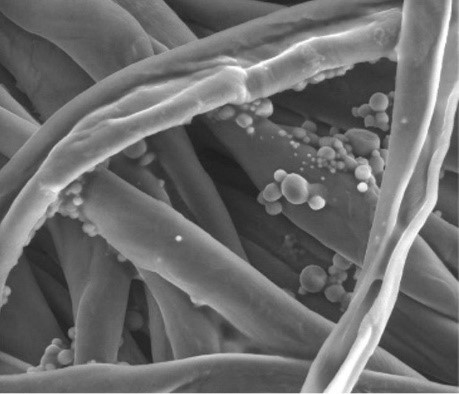
The present invention consists in microcapsules with fragrant and antibacterial properties for application onto textile substrates using non-toxic and eco-friendly materials. Microcapsules were obtained by the complex coacervation method from two different materials, gum Arabic and chitosan, using limonene and vanillin (in pure form and not vanilla oil) as the core active principles, tannic acid as the hardening agent and citric acid for the grafting onto cotton textiles.
The hydrophilicity and porosity of natural fabrics (e.g. cotton) make them highly susceptible to microorganism adhesion and growth, resulting in unpleasant odors, disease transmission and allergic responses. This invention aims to overcome the serious threat, for both human health and environment, brought by the majority of commercially available textile applicable microcapsules (e.g. formaldehyde-based materials), additionally to the aroma and antibacterial properties.
The produced limonene and vanillin microcapsules show high encapsulation efficiencies (ranged between 90,4% and 100%). Also, these microcapsules have a sustained release pattern. Namely, the total cumulative release of the active agents after 7 days at 37±1⁰C was 75%, 52% and 19,4% for the polynuclear limonene microcapsules, the mononuclear limonene microcapsules and the polynuclear vanillin microcapsules, respectively. Grafting of the produced microcapsules onto cotton fabrics through chemical esterification with citric acid was confirmed by SEM and ATR-FTIR spectroscopy. Standard antibacterial assays conducted on both microcapsules alone and impregnated onto the fabrics pointed out for a sustained antibacterial activity against Escherichia coli and Straphylococcus aureus.
This technology is useful for textile products where there is a need for sustained antibacterial activity or aromatherapy, for instance in health and home textiles. Moreover, the growing trend of eco and smart textiles in sports and apparel industry can benefit from this invention. This technology is under testing. The strategy to achieve the immobilization of the produced limonene and vanillin microcapsules onto cotton fabrics was developed, and their antibacterial activity (alone or impregnated onto the fabric) evaluated.






